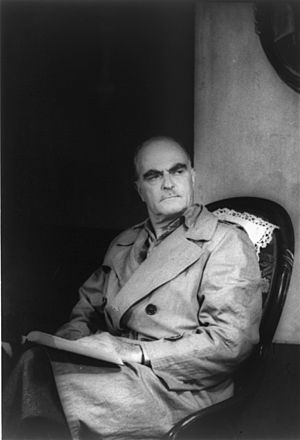Thornton Wilder facts for kids
Quick facts for kids
Thornton Wilder
|
|
|---|---|
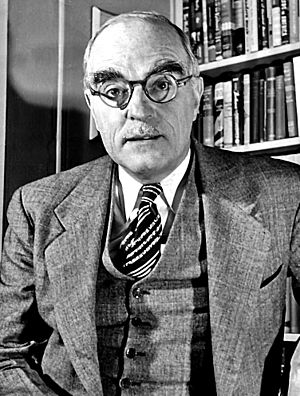
Wilder in 1948
|
|
| Born | Thornton Niven Wilder April 17, 1897 Madison, Wisconsin, U.S. |
| Died | December 7, 1975 (aged 78) Hamden, Connecticut, U.S. |
| Occupation |
|
| Notable works |
|
| Notable awards |
|
| Relatives | Thornton M. Niven |
Thornton Niven Wilder (born April 17, 1897, died December 7, 1975) was an American writer. He wrote plays and novels. He won three important awards called the Pulitzer Prize. He won for his novel The Bridge of San Luis Rey and for his plays Our Town and The Skin of Our Teeth. He also won a National Book Award for his novel The Eighth Day.
Contents
Early Life and Family
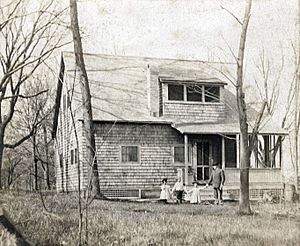
Thornton Wilder was born in Madison, Wisconsin. His father, Amos Parker Wilder, was a newspaper editor who later became a U.S. diplomat. His mother was Isabella Thornton Niven.
Wilder had four brothers and sisters. He also had a twin who was stillborn. All the Wilder children lived in China for a while. This was when their father worked as a U.S. Consul General in Hong Kong and Shanghai. Thornton's older brother, Amos Niven Wilder, became a professor at Harvard Divinity School. He was also a well-known poet. Their sister Isabel Wilder was a talented writer. His other sisters were Charlotte Wilder, a poet, and Janet Wilder Dakin, a zoologist.
Education and Learning
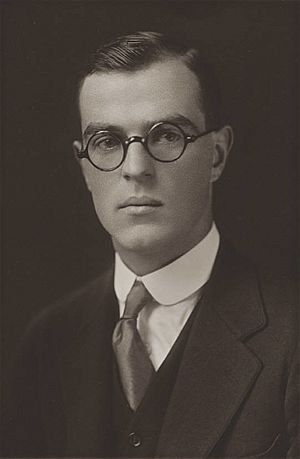
Wilder started writing plays when he was at Thacher School in Ojai, California. He felt like he didn't fit in there. Other students teased him for being too smart. A classmate said they "left him alone." He would hide in the library, which was his special place.
His family lived in China for some time. His sister Janet was born there in 1910. Thornton went to the English China Inland Mission Chefoo School in Yantai. But he returned to California with his mother and siblings in 1912. This was because of political problems in China. Thornton finished high school at Berkeley High School in 1915.
After high school, he joined the Army for three months during World War I. He was a corporal in the Coast Artillery Corps. Then, he went to Oberlin College. He earned his first degree in 1920 from Yale University. There, he improved his writing skills. He later earned a master's degree in French literature from Princeton University in 1926.
Writing Career and Achievements
After college, Wilder went to Italy. He studied archaeology and Italian for eight months. Then, in 1921, he started teaching French at the Lawrenceville School in Lawrenceville, New Jersey.
His first novel, The Cabala, came out in 1926. In 1927, his book The Bridge of San Luis Rey became very popular. It also won him his first Pulitzer Prize in 1928. He left the Lawrenceville School in 1928.
From 1930 to 1937, he taught at the University of Chicago. He became famous as a speaker there. In 1938, he won the Pulitzer Prize for Drama for his play Our Town. He won the prize again in 1943 for his play The Skin of Our Teeth.
During World War II, Wilder served in the U.S. Army Air Force. He became a lieutenant colonel in intelligence. He served in Africa and Italy until 1945. He received several awards for his military service.
Later, he was a visiting professor at Harvard University. He always thought of himself as a teacher first and a writer second. But he kept writing throughout his life. He received the Peace Prize of the German Book Trade in 1957. In 1963, he received the Presidential Medal of Freedom. In 1968, he won the National Book Award for his novel The Eighth Day.
Wilder knew four languages well. He translated plays by André Obey and Jean-Paul Sartre. He also wrote the stories for two operas. One was The Long Christmas Dinner. The other was The Alcestiad. The famous director Alfred Hitchcock asked him to write the script for his movie Shadow of a Doubt. Wilder wrote the first version of the script.
Famous Works
The Bridge of San Luis Rey
The Bridge of San Luis Rey (1927) tells the story of several people. They happen to be on a bridge in Peru when it falls down, killing them. The book asks why bad things happen to people who seem innocent. It won the Pulitzer Prize in 1928. In 1998, it was named one of the 100 best novels of the 20th century. The book was mentioned by British Prime Minister Tony Blair after the September 11 attacks in 2001. Its popularity has grown a lot since then. This book helped create the idea of modern disaster stories in books and movies. In these stories, a single disaster connects the victims. Their lives are then shown through flashbacks.
Our Town
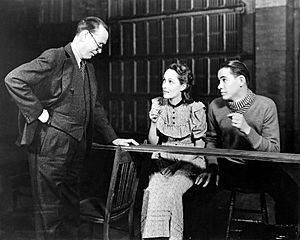
Wilder wrote Our Town, a very popular play. It later became a film. The play is set in a made-up town called Grover's Corners, New Hampshire. It was partly inspired by Dante's Purgatorio. It was also inspired by his friend Gertrude Stein's novel The Making of Americans. Wilder had trouble writing the last part of the play.
Our Town uses a narrator called the Stage Manager. It also uses a very simple set. This helps show the human experience. Wilder himself played the Stage Manager on Broadway for two weeks. The play shows the daily lives of the Gibbs and Webb families. It also shows other people in Grover's Corners. The play teaches us to appreciate the simple but important lives of all people. It won the 1938 Pulitzer Prize.
The Skin of Our Teeth
His play The Skin of Our Teeth opened in New York on November 18, 1942. It starred Fredric March and Tallulah Bankhead. This play also explores big ideas. It looks at the human condition through time. It shows how history can repeat itself. It also uses literature, philosophy, and religion as important guides for civilization. The play has three acts. They show the challenges of the Antrobus family. This family represents the history of mankind.
The Matchmaker
In 1938, a play called The Merchant of Yonkers was put on Broadway. Wilder had changed it from an Austrian play. It was not successful and closed quickly.
In 1954, Tyrone Guthrie encouraged Wilder to rewrite The Merchant of Yonkers. It became The Matchmaker. This time, the play opened in 1955 and was very successful. It ran for 486 shows on Broadway. Ruth Gordon played the main role. The play won a Tony Award for its director, Guthrie. It later became the basis for the popular 1964 musical Hello, Dolly!.
Later Novels
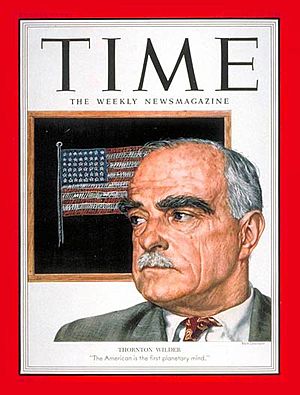
In his novel The Ides of March (1948), Wilder recreated the people and events leading up to the killing of Julius Caesar. He had met Jean-Paul Sartre after the war. Wilder was influenced by a way of thinking called existentialism. However, he did not agree with its idea that there is no God.
In 1960, Wilder received the first Edward MacDowell Medal. This award is for great contributions to American culture.
In 1962 and 1963, Wilder lived alone for 20 months in Douglas, Arizona. There, he started his longest novel, The Eighth Day. It went on to win the National Book Award. It explored big questions within the story of a small American town.
His last novel, Theophilus North, was published in 1973. It was later made into the film Mr. North in 1988.
Personal Life
Wilder had many friends. These included writers like Ernest Hemingway and Gertrude Stein. He was also friends with actress Ruth Gordon and boxer Gene Tunney.
In 1930, Wilder used money from The Bridge of San Luis Rey to build a house. It was for his family in Hamden, Connecticut. His sister Isabel lived there for the rest of her life. This house became his main home. But he traveled a lot and lived in other places for long periods.
Death
Thornton Wilder died in his Hamden house on December 7, 1975. He was 78 years old. He died of heart failure. He was buried at Mount Carmel Cemetery in Hamden.
See also
 In Spanish: Thornton Wilder para niños
In Spanish: Thornton Wilder para niños
 | Toni Morrison |
 | Barack Obama |
 | Martin Luther King Jr. |
 | Ralph Bunche |


